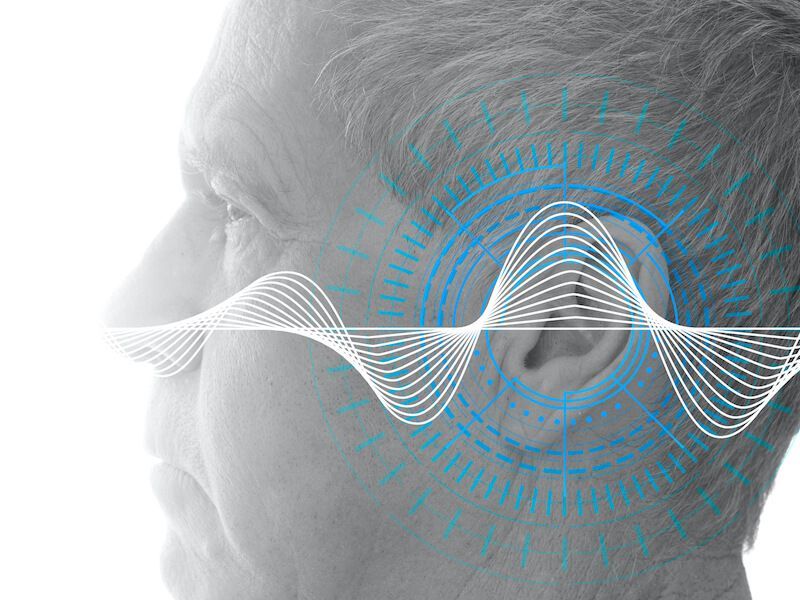What’s the Connection Between Hearing Loss and Dementia?

If you start talking about dementia at your next family get-together, you will most likely put a dark cloud over the whole event.
The topic of dementia can be really frightening and most people aren’t going to go out of their way to discuss it. Dementia, which is a degenerative cognitive disease, causes you to lose a grip on reality, experience loss of memory, and brings about an over-all loss of mental faculties. Nobody wants to experience that.
This is why many people are looking for a way to counter, or at least delay, the advancement of dementia. It turns out, untreated hearing loss and dementia have several pretty clear connections and correlations.
That may seem a bit… surprising to you. What could your brain have to do with your ears after all? Why are the risks of dementia multiplied with hearing loss?
What happens when your hearing loss is neglected?
Maybe you’ve detected your hearing loss already, but you’re not too worried about it. You can simply crank up the volume, right? Maybe you’ll simply turn on the captions when you’re watching your favorite show.
But then again, maybe you haven’t detected your hearing loss yet. Maybe the signs are still easy to dismiss. Cognitive decline and hearing loss are strongly linked either way. That’s because of the effects of untreated hearing loss.
- Conversation becomes harder to understand . As a result, you may begin isolating yourself socially. You can withdraw from friends, family, and loved ones. You won’t talk with others as often. It’s bad for your brain to separate yourself this way. It’s not good for your social life either. Further, most people who have this type of isolation won’t even realize that hearing loss is the cause.
- Your brain will start to work much harder . Your ears will get less audio information when you have untreated hearing loss. Because of this, your brain will attempt to fill in the gaps. This is unbelievably taxing. The current theory is, when this occurs, your brain draws power from your thought and memory centers. The idea is that after a while this results in dementia (or, at least, helps it progress). Mental fatigue and exhaustion, as well as other possible symptoms, can be the consequence of your brain needing to work so hard.
So your hearing impairment is not quite as harmless as you may have thought.
One of the leading indicators of dementia is hearing loss
Let’s say you only have slight hearing loss. Whispers might get lost, but you can hear everything else so…no problem right? Well, turns out you’re still twice as likely to get dementia as somebody who doesn’t have hearing loss.
Which means that even minor hearing loss is a fairly good preliminary indication of a risk of dementia.
Now… What does that suggest?
We’re considering risk in this circumstance which is important to note. Hearing loss is not a guarantee of dementia or even an early symptom of dementia. It does mean that later in life you will have an increased chance of developing cognitive decline. But that can actually be good news.
Because it means that successfully dealing with your hearing loss can help you lower your risk of dementia. So how can you deal with your hearing loss? Here are a few ways:
- Set up an appointment with us to diagnose your existing hearing loss.
- The affect of hearing loss can be minimized by wearing hearing aids. So, can cognitive decline be prevented by wearing hearing aids? That’s tough to say, but hearing aids can boost brain function. Here’s why: You’ll be more socially involved and your brain won’t need to work so hard to have conversations. Research suggests that managing hearing loss can help decrease your danger of developing dementia in the future. That’s not the same as preventing dementia, but it’s a good thing regardless.
- If your hearing loss is detected early, there are some measures you can take to protect your hearing. You could, for instance, wear ear protection if you work in a noisy setting and steer clear of noisy events like concerts or sporting events.
Other ways to reduce your dementia risk
You can decrease your risk of cognitive decline by doing some other things as well, of course. Here are a few examples:
- A diet that keeps your blood pressure down and is good for your overall well being can go a long way. For individuals who naturally have higher blood pressure, it may be necessary to take medication to lower it.
- Getting enough sleep at night is crucial. Some research links an increased risk of dementia to getting less than four hours of sleep every night.
- Exercise is needed for good general health including hearing health.
- Stop smoking. Seriously. Smoking will increase your risk of dementia as well as impacting your general health (excess alcohol drinking can also go on this list).
Needless to say, scientists are still researching the connection between dementia, hearing loss, lifestyle, and more. It’s a complicated disease with an array of causes. But the lower your risk, the better.
Hearing is its own benefit
So, hearing better will help lower your general risk of developing cognitive decline in the future. You’ll be improving your life now, not just in the future. Imagine, no more solitary visits to the store, no more confused conversations, no more misunderstandings.
It’s no fun missing out on life’s important moments. And taking steps to manage your hearing loss, maybe by using hearing aids, can be really helpful.
So make sure to schedule an appointment with us right away!
Call Today to Set Up an Appointment
References
https://publichealth.jhu.edu/2021/hearing-loss-and-the-dementia-connection


